ICICI Foundation's Focus on Social Development
ICICI Bank continues to promote its inclusive social development agenda through impactful initiatives. In support of this agenda, ICICI Foundation is working on key projects in the areas of healthcare, livelihood creation and community development. Its initiatives are directed towards steering positive social change by meeting the local development needs of communities. Its focus is on fostering an environment where affordable healthcare is within easy access of all and socially deprived communities get opportunities for holistic development. Its livelihood generation initiatives are helping to create sustainable village ecosystems across states. ICICI Foundation had positively impacted the lives of over 18.9 million people across India through such initiatives till March 31, 2025.
Healthcare
- Support tech-integrated capacity building in healthcare
- Provide critical and other vital healthcare facilities and equipment to hospitals and other medical institutions
- Support accessibility to affordable healthcare for underserved individuals
- Mobility support for people with locomotive disabilities
2.5
Livelihood
- Develop holistic value chain for rural activities
- Undertake rural skilling and financial literacy initiatives
9.1
Societal Development
- Promote rural infrastructure development
- Empower socially-deprived communities
- Conduct financial literacy programmes
7.3
(Individuals benefitted in million)
ICICI Bank remains committed to promoting affordable and accessible healthcare across underdeveloped and remote regions of India. ICICI Foundation actively supported healthcare programmes, focussing on cancer care, cardiac care, and eye care, in fiscal 2025. By integrating technology into healthcare, the Foundation is making a significant impact on the lives of individuals in need of medical care.
The Foundation’s healthcare interventions enabled 2.5 million individuals to access quality treatment in 550 hospitals across India since 2020. Its initiatives have benefitted a 400,000 people in fiscal 2025.
Providing Equipment for Cancer Patients
ICICI Foundation expanded its cancer care outreach programme for Tata Memorial Centre (TMC) by supporting the Advanced Centre for Treatment, Research and Education in Cancer (ACTREC), Kharghar, Navi Mumbai, Maharashtra. The Foundation has provided a Dual Energy Computed Tomography (CT) Simulator, a state-of-the-art imaging tool that enhances precision of radiation therapy.
This equipment enables detailed 3D imaging for accurate radiation targeting, ensuing better diagnostic performance and potential reduction in contrast agent and radiation. It plays a crucial role in radiotherapy treatments, particularly benefitting children and youth, adults afflicted with cancers.
ICICI Bank has committed more than ₹18 billion to TMC for setting up three new cancer care facilities with state-of-the-art infrastructure and equipment—one each in Maharashtra, Punjab, and Andhra Pradesh. In June 2025, the construction of the ICICI Foundation Block for Child and Blood Cancer Care in Visakhapatnam, Andhra Pradesh commenced.
Partnering with IITs on Healthcare Technology Innovations
ICICI Foundation has joined hands with Indian Institute of Technology (IIT) at Mumbai in Maharashtra and Kanpur in Uttar Pradesh, to drive healthcare technology advancements.
The Foundation has committed over ₹700 million to expand the Biomedical Engineering and Technology Innovation Centre (BETIC) facility at IIT Bombay and establish the ‘IIT-ICICI BETIC Hub’. This expansion has the potential to increase biomedical engineering capabilities five-fold at IIT Bombay. The hub will support med-tech startups and shall train professionals to build and operate state-of-the-art medical equipment and fixtures that will eventually be scaled up to benefit millions of patients.
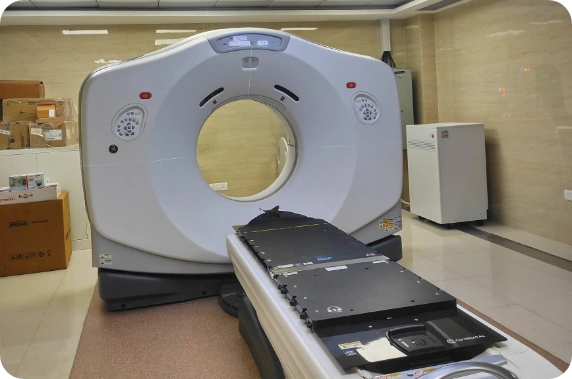
A dual energy CT simulator provided at ACTREC in Navi Mumbai, Maharashtra
ICICI Bank partnered with the Indian Institute of Technology (IIT) Kanpur to develop a state-of-the-art ICICI Digital Health Stack (ICICI-DHS). It aims to fortify India’s public healthcare systems through technology and innovation. Envisioned as a modular, scalable and open digital platform, ICICI-DHS will address evolving healthcare requirements by integrating digital tools and systems.
The partnership will develop a Real-Time Availability and Referral Portal (RT-BARP) for the Department of Medical Health & Family Welfare, Govt of UP. It is an inter-hospital referral and monitoring system, created to enable faster medical care. This digital platform facilitates efficient patient tracking and ambulance coordination, ensuring faster medical care in the city of Kanpur.
RT-BARP was enabled during the Maha Kumbh Mela in Uttar Pradesh in early 2025, the world’s largest peaceful congregation of people from across the globe to take a dip in the junction of rivers Ganga, Yamuna and Saraswati and offer prayers at Prayagraj in Uttar Pradesh. It enabled real-time patient data capture across 18 hospitals and 10 first-aid posts, allowing medical professionals to prepare in advance for patient arrival, minimising delays in accessing critical care in time of need during the Kumbh Mela.
Watch a video on ICICI Foundation’s initiative at Maha Kumbh Mela.
Expanding Quality Eyecare in Tamil Nadu
Sankara Eye Foundation, India (SEFI), is a not-for-profit public charitable trust committed to eliminating preventable and curable blindness. ICICI Foundation supported SEFI by providing state-of-the-art surgical equipment—the Schwind Amaris 1,050 refractive platform—at the Trust's hospital in Coimbatore.
Recognised as the world’s highest-performing eye laser for refractive and therapeutic corneal surgery, this equipment enhances precision and efficiency in ophthalmic procedures. The initiative has led to reduction in time to half for surgical procedures due to the equipment’s advanced diagnostic capabilities and has reduced cost of surgery, ensuring cost-effective treatment. The equipment aims to serve over 600 patients annually.
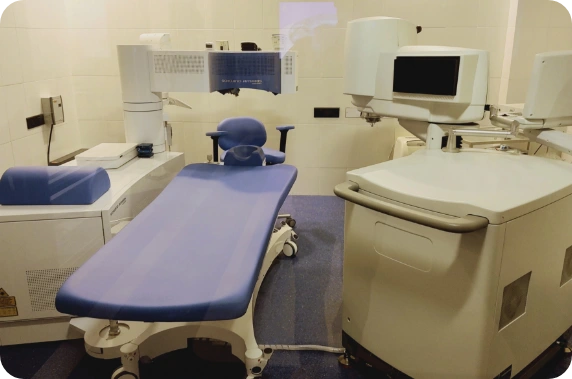
A state-of-the-art refractive laser equipment provided by ICICI Foundation at Sankara Eye Foundation in Coimbatore, Tamil Nadu
Equipping Eye Hospital with Solar Power
ICICI Foundation facilitated the transition from grid power to renewable energy at Pushpagiri Vitreo Retina Institute (PVRI) in Kadapa district, Andhra Pradesh.
The initiative has facilitated over 1,370 free sight restoration surgeries. It has saved over 225 tonnes of carbon emissions and ₹2.6 million in electricity costs.
Supporting Cardiac Care in Punjab
ICICI Foundation is committed to advancing medical technology for education and skill development in the healthcare sector.
The Foundation partnered with Baba Farid University of Health Sciences (BFUHS) in Faridkot district, Punjab, and donated a robotics simulator to enhance its training standards and equip students with cutting-edge robotic surgery skills.
The Simbionix RobotiX Mentor, developed by Surgical Science, includes comprehensive modules for robotic surgery and training, benefitting 10 medical colleges affiliated with BFUHS. Annually, over 250 students and medical professionals are expected to gain hands-on experience in robotic surgical technique.
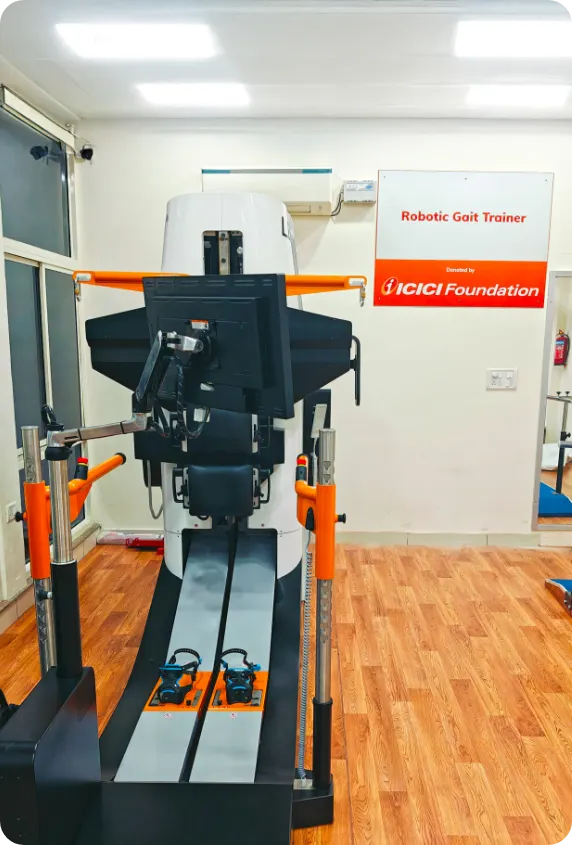
A robotic gait trainer at BMVSS in Jaipur, Rajasthan
Supporting Individuals with Disabilities
ICICI Foundation has undertaken several initiatives to empower persons with disabilities (PwDs), including children with special needs, by facilitating their ability to perform daily activities with minimal limitations.
In fiscal 2025, the Foundation donated a gait training machine to Bhagwan Mahaveer Viklang Sahayata Samiti (BMVSS) in Jaipur, Rajasthan, for enhancing mobility, strengthen muscles and accelerating recovery of individuals with mobility impairments.
BMVSS, globally renowned for its prosthetic Jaipur Foot, is the largest organisation in the world dedicated to rehabilitating individuals with disabilities.
The newly donated robotic rehabilitation equipment integrates seamlessly into existing services provided at BMVSS, offering personalised therapy for patients with lower limb paralysis or mobility restrictions. The machine operates through a robotic interface, simulating natural walking patterns and enabling repetitive, task-specific gait movement in a controlled environment.
In another initiative, ICICI Foundation donated a Hydrotherapy Treadmill to Asha Rehabilitation Centre (ARC) at Narangi Cantonment in Guwahati, Assam. The ARC, managed by the Army Wives Welfare Association, is a not-for-profit organisation dedicated to the welfare of families of the Army, particularly, the spouses, children, and dependents of Army personnel. The centre offers education, sports infrastructure, medical therapies and rehabilitation training for differently-abled children from the Defence forces and civilian communities.
The treadmill aids rehabilitation by utilising water pressure to stimulate muscles, facilitating recovery for children with mobility restrictions. The treadmill aims to benefit over 60 students annually.
ICICI Foundation is committed to advancing livelihood and skill development initiatives across India’s rural and urban landscapes. Each year, the Foundation undertakes various projects to strengthen local ecosystems through rural value chain development. The Foundation has benefitted 9.1 million individuals through its livelihood projects till March 31, 2025. In fiscal 2025, the number of beneficiaries of such programmes stood at 5.4 million.
Livelihood Initiatives
In fiscal 2025, ICICI Foundation continued its support for farmers through value chain development projects. A key focus of these initiatives was diversification of agriculture produce, aimed at enhancing farmers’ capacity to broad-base their income streams. This was achieved through horticulture and orchard plantation programmes, wherein the Foundation provided farmers with high-quality seeds and specialised training in modern, efficient farming techniques.
Reviving Millet Cultivation in Tribal Communities
ICICI Foundation initiated a holistic programme to revive millet farming in 118 villages across tiger reserves in Madhya Pradesh, addressing declining productivity, soil degradation, and limited market access.
The programme integrates traditional knowledge of farming with modern innovations, encouraging self-sustaining agriculture practices among tribal communities.
Project Execution
- Distribution of certified millet seeds, leading to average productivity of three quintals per acre.
- Supply of one litre of bio-fertilisers for seed treatment and introduced certified 6 kgs of seeds per acre.
- Establishments of 450 village-level bio-input centres locally known as 'Jaivik ghars', for organic fertilisers and bio-pesticides, utilising local materials such as cow dung, neem and plant waste.
- Vermicomposting units set up to convert agricultural waste into nutrient-rich compost, improving soil fertility, and reducing reliance on synthetic fertilisers.
Impact
- About 2,180 farmers benefitted.
- 1,090 acres covered under millet cultivation.
- Household income in participating villages grew by 20%.
- Millet productivity increased from two to three quintals per acre.
Generating Income through Mushroom Cultivation in Odisha
Since 2019, ICICI Foundation has been actively supporting tribal women farmers in Odisha mushroom cultivation programmes, generating sustainable additional income over a five- to- six-month period annually.
Project Expansion
- The programme now supports nearly 16,230 women farmers across 159 villages in three districts.
- Around 9,400 farmers cultivate mushrooms for household consumption, improving immunity and overall nutrition.
- 700-800 farmers engaged in commercial production, leading to income generation and lifestyle improvement.
- To enhance seed availability locally, ICICI Foundation established a spawn (mushroom seeds) production unit in collaboration with few Self-Help Group (SHG) in fiscal 2021, reducing farmers’ dependency on external markets.
Impact
212,790 kg
of mushrooms produced, valued at ₹19 million since 2019
49,760 kg
of spawn generated since fiscal 2022
(At March 31, 2025)
Value Chain
Boosting Farmers’ Income in Meghalaya
Farmers in Ri Bhoi district, Meghalaya face low crop productivity due to multiple unfavourable factors like low crop productivity, soil erosion, crop diseases, outdated cultivation practices and limited access to quality planting material. These factors adversely impact their agricultural income.
To address these issues, ICICI Foundation initiated projects aimed at strengthening the region’s agriculture value chain. The intervention in Umling block in the district included providing farmers with healthy pineapple saplings and high-quality seeds (ginger and turmeric), along with training in modern cultivation techniques to improve productivity and adopt sustainable farming practices.
Project Highlights
- Distribution of 1.26 million healthy pineapple saplings to 310 farmers.
- Supply of 138,500 kg ginger seeds and 49,350 kg turmeric seeds to farmers.
- Promotion of cultivation practices to, leverage on the region's high rainfall and reduce dependency on irrigation.
- Introduction of sustainable farming practices, including inter-cropping, and setting up of processing and storage units in the long-term.
- Formation of Farmer Producer Groups or Cooperatives to facilitate collective marketing.
Impact
- 310 small and marginal farmers benefitted from pineapple cultivation.
- Expansion of farmland by 10% (300 acres) in 35 villages in the region’s pineapple belt.
- Farmers expected to earn an additional ₹120,000 per acre a year from pineapple cultivation.
- Pineapple productivity projected to double to over 9,000 kg per acre, aligning with national benchmarks.
- Ginger cultivation to bring in additional income of about ₹113,000 per acre annually post 1.8 years of cultivation period.
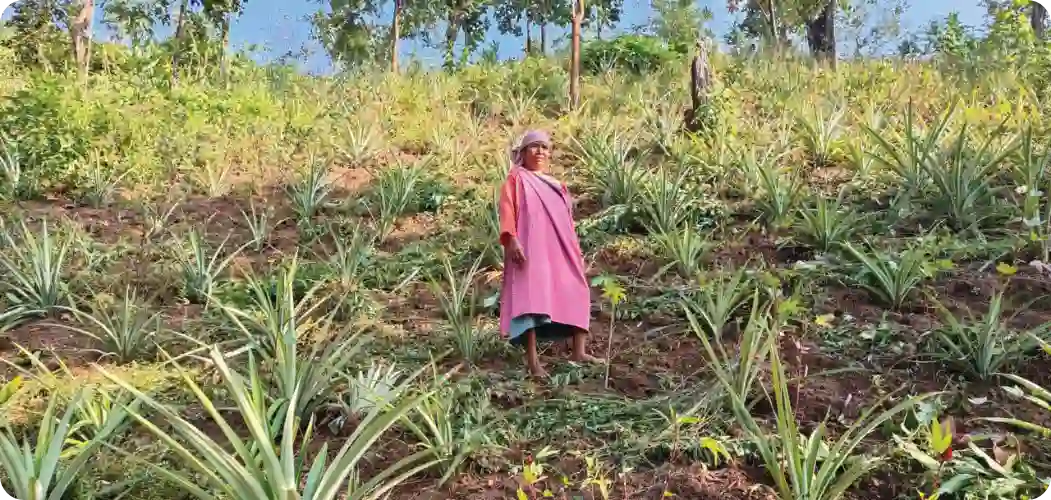
A farmer at a pineapple orchard at Umling block in Ri Bhoi district, Meghalaya
- Ginger productivity is estimated to increase to 3,200 kg per acre, aligning with national benchmarks post 1.8 years of cultivation period.
- Turmeric cultivation will annually contribute ₹25,000 of additional income per acre post 1.8 years of cultivation period.
- Turmeric productivity is estimated to increase to 1,000 kg per acre, aligning with national benchmarks post 1.8 years of cultivation period.
- 871 marginal farmers benefitted from spices cultivation, which will cover 277 acres of land with ginger crop and 180.5 acres with turmeric cultivation.
ICICI Bank has always recognised the criticality of inclusivity. Mainstreaming the marginalised communities is important for societal and economic progress, which is primarily possible by improving their employability. As part of this objective, ICICI Foundation set up the ICICI Academy for Skills in 2013 to bridge the skill gap and enhance employability of underserved segments—including school dropouts, women, rural youth, and persons with disabilities. Through 26 centres set up across 20 states, the Academy offered industry-aligned short-term vocational training, on pro-bono basis, and also facilitated employment to support livelihood. In fiscal 2025, we successfully concluded the ICICI Academy for Skills programme after 13 years. During the journey, over two lakh individuals were benefitted through enhanced employment opportunities, and achieving our intended objective of promoting inclusive growth.
ICICI Foundation plays a pivotal role in infrastructure and skill development to enhance livelihood opportunities in India. In collaboration with leading academic and research institutions, the Foundation leverages specialised skilling training through scalable, technology-driven courses.
Industry 4.0 Skilling for Gujarat ITI Students
Industry 4.0 refers to the fourth industrial revolution, characterised by the integration of AI, Internet of Things (IoT), and robotics into manufacturing and industrial automation. To equip students with future-ready skills, ICICI Foundation has supported the International Professional Technician Certificate Programme at the NAMTECH School of Social Impact.
NAMTECH (New Age Makers’ Institute of Technology) is a pioneering institution, accelerating India’s Manufacturing, Engineering, and Technology (MET) sector. The programme is designed to enhance the technical competencies and employability of students enrolled in government Industrial Training Institutes (ITIs) across Gujarat, offering specialised training in:
- Smart manufacturing
- Numerical proficiency
- English language proficiency
Key Highlights
- Five ITIs designated as ‘hubs’ equipped with smart manufacturing and digital-edge labs.
- Training across five high-demand trades namely precision engineering, energy automation, industrial automation, automotive technology, and advanced welding.
- Over 2,000 ITI students will be benefitted annually.
Financial Literacy
The Foundation has been regularly conducting financial literacy programmes to empower individuals with essential knowledge and skills required for personal financial planning and risk management. The programme covers topics like financial budgeting, insurance, investments, cyber-security, among others. The Foundation partners with government departments, corporate entities and other institutions across the country to conduct financial literacy sessions. These sessions are also conducted for beneficiaries of livelihood programmes. Overall, 210,000 individuals have benefitted since inception.
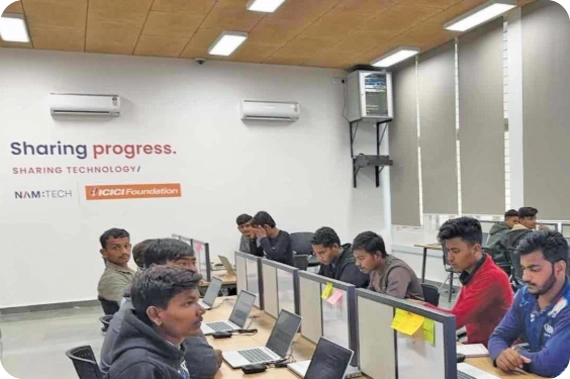
Students learning at a computer lab at NAMTECH in Gandhinagar, Gujarat